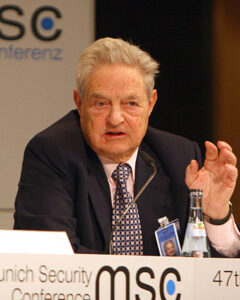Unearthing the Ties Between USAID and Soros: A Closer Look at Foreign Aid and Political Influence
Welcome back to the Extreme Investor Network, where we strive to provide you with in-depth analyses of economic issues that impact your investment decisions and understanding of global dynamics. Today, we delve into a topic that is both timely and contentious: the relationship between USAID (the United States Agency for International Development) and the influential figure of George Soros. This exploration exposes not only the financial connections but also the broader implications for global democracy and American values.
The Monetary Web: USAID and George Soros
Recently, reports surfaced that USAID awarded a staggering $260 million in grants to various organizations linked to George Soros, a billionaire philanthropist known for his advocacy of liberal democratic values worldwide. Critics argue that these grants have been used to push political agendas rather than merely serve humanitarian purposes. In the past election, it was revealed that USAID’s funding heavily favored the Democratic Party, with an astonishing 97% of political contributions directed toward them. This raises questions: Is USAID acting as a vehicle for political influence under the guise of foreign aid?
One notable beneficiary of these funds is the East-West Management Institute, which received $90 million. Their mission? To "strengthen democratic societies" by fostering cooperation among various societal sectors. However, critics have pointed out that such collaborations often lead to the dismantling of traditional Western values, which raises alarms for those of us who value the foundations upon which our democracy stands.
The Role of NGOs: Allies or Adversaries?
At the heart of this scheme are NGOs (non-governmental organizations) closely associated with Soros and his Open Society Foundations (OSF). While these organizations present themselves as champions of transparency and democracy, there is a growing concern that they wield considerable influence over local governance in various countries, often undermining democratic processes.
For example, the Anti-Corruption Action Centre and the Alliance for Open Society International have benefited from substantial USAID funding. Strikingly, the latter was even involved in litigation against USAID, arguing against mandated anti-prostitution policies for grant recipients. Such dynamics highlight a fraught intersection of foreign aid and political maneuvering, raising ethical questions about what constitutes proper use of taxpayer dollars in an international context.
A Case Study: Macedonia
Judicial Watch recently uncovered troubling evidence regarding USAID’s activities in Macedonia, where USAID allegedly funneled $5 million to Soros-affiliated organizations. This financial support is believed to have contributed to the destabilization of Macedonia’s democratically elected center-right government. Under the administration of former President Obama, who has familial ties to USAID through his mother, diplomatic leverage was allegedly used to promote a specific political agenda in another nation.
As one Judicial Watch statement put it, American taxpayer funds were utilized to interfere with the internal politics of a sovereign nation—a scenario that seems to contradict the very principles of the democracy the U.S. seeks to export.
The Broader Implications: U.S. Interests vs. Globalism
In an era where discussions around globalization and nationalism are heated, the actions of USAID under political influence prompt a crucial examination of our foreign aid framework. Does USAID serve as an effective vehicle for fostering democracy abroad, or is it merely a tool for political agendas masked under the pretense of aid? More importantly, what does this mean for American citizens who unwittingly fund these initiatives?
As support for organizations intertwined with Soros raises red flags among many, the implications reach far beyond electoral politics. It speaks to the integrity of our foreign aid, the principles of American democracy, and the extent to which globalist agendas can seep into domestic policy frameworks.
Conclusion: Holding Power to Account
At the Extreme Investor Network, we believe that informed investments and decisions emerge from transparent governance and accountability across all sectors. We urge our readers to stay vigilant about how public resources — including those meant for humanitarian aid — are being utilized. As we navigate these complex waters, it becomes paramount to critically assess the motivations behind foreign aid and hold all entities accountable for their roles in shaping global political landscapes.
Diaspora politics cannot remain hidden behind the buzzwords of humanitarian efforts; transparency is not just a goal but a necessity if we are to safeguard our democratic values and ensure that foreign aid serves the best interest of all. If you found this analysis insightful, stay tuned to the Extreme Investor Network for more in-depth discussions and data-driven content regarding the interplay of economics and political power.

